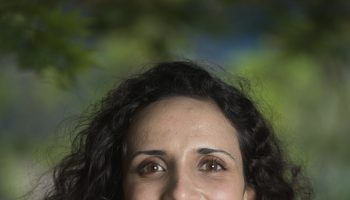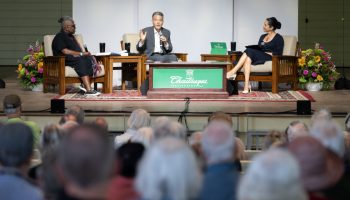
Mary Lee Talbot
Staff Writer
“The Bible is rich with many wonderful stories. Do you have a favorite?” Rabbi Peter S. Berg asked the congregation at the 9:15 a.m. Thursday morning worship service in the Amphitheater. “Maybe it’s the story of Creation, David and Goliath or Noah. My favorite might be a surprise — it is the story of Isaac.”
Berg’s sermon title was “A Man InBetween,” and the scripture reading was Genesis 26:18–23.
“The story of Isaac is an odd story. It is short and squeezed between the stories of Abraham, the father of our faith, and Jacob, who became Israel, and his son Joseph, the dreamer. Issac is an in-between kind of guy, and I feel like an in-between guy,” Berg said.
Berg and his wife recently took one of their sons to the University of Michigan to begin school. He described his feelings as being in between the gratitude for all the years he has had with his son, and the joy, hope and anxiety of the blessing his son might become in the future.
“We cannot live in the glory of the past, and the future is not yet in hand,” he told the congregation. Where do we turn? “Isaac first turned to the past, to the resources and traditions of the past.”
During a famine, Isaac moved to Gerar in the land of the Philistines, but his neighbors were jealous of him, so he moved back to the Wadi Gerar where Abraham had lived. The Philistines had filled in the wells that Abraham dug. “The Philistines clogged up the resources, and Isaac had to get the resources, the wells, working again,” Berg said.
Berg cited a trend in Israeli literature through the writings of three Israeli women about younger, secular Jews on a journey to return to their roots, to rediscover the tradition and move into a covenantal relationship with God.
Alma, the heroine of one book, believes that Judaism is a trap and pushes the boundaries of rebellion. She and her boyfriend move to a seedy hotel in Amsterdam, and she flaunts her sexual explorations. But she encounters a sense of emptiness and has an awakening that God is touching her life.
She experienced the feeling of the psalmist in Psalm 139, “Where can I go from your spirit? / Or where can I flee from your presence? / If I ascend to heaven, you are there; / if I make my bed in Sheol, you are there.”
Berg said, “God waited for her to let God’s light shine within her. She realized there was nothing to run away from and that she should open the little door in the garden wall. She was redigging her ancestral wells.”
The rabbis, in the Midrash, asked how many wells Isaac dug. They said he dug five for the five books of the Torah. “It was an act of loyalty to the values of his faith and to faithful living,” Berg said.
Isaac’s actions were controversial; the locals were hostile. Berg said, “The more we rediscover the roots of our values, the more controversial we become. Two of the wells he tried to re-open were named Esek and Sitnah, contention and harassment.”
So Isaac turned to the future, to dig new wells. Water is a metaphor for redemption, Berg said, and the fresh water saved the people. With the digging of new wells, Isaac showed he trusted God not to leave him in an in- between place.
“We have much to learn about the courage of faith to dig new wells. By trusting God, Isaac moved the story of faith into the future,” he said. “God brings up leaders, individuals with extraordinary spiritual values, who set the path and the vision. But God also needs the Isaacs who recover old wells and dig new ones. They were needed during the Holocaust and are needed today to safeguard our liberty.”
Berg told the congregation that they need to be the Isaacs of this moment in history. “Reach back, and dust off your old confirmation Bible, advocate for faith causes, then in faith move toward the future and dig new wells.”
During World War II, the Nazis sought to destroy the Jewish people and their heritage. They burned many Torah scrolls, but they did not destroy all the scrolls or the people, said Berg. “When sofer (scribe) Neil Yerman works on restoring scrolls, he feels others are present. He said, ‘I feel those who died watching and whispering to me. I am not just restoring the scroll but giving life to the Torah. Every Torah is alive.’ ”
Berg continued, “Our lesson is to live today in faith and have hope in our time for the future.”
Renee Andrews, who serves as a commissioner on the Falls Church, Virginia, election board, presided. Arlette Berlin, who is a member of The Temple in Atlanta where Rabbi Berg serves, read the scripture. The Motet Consort performed Trio Sonata in G Major: Adagio, Presto, by Johann Ludwig Krebs. The trio included Barbara Hois and Rachel Stuart on flute and Willie LaFavor on piano. The Motet Choir sang “Sim Shalom,” by Max Janowski; Rachel Stuart was the soloist. The choir was under the direction of Joshua Stafford, director of sacred music and the Jared Jacobsen Chair for the Organist, and accompanied by Owen Reyda, organ scholar, on the Massey Memorial Organ. Laura Smith, organ scholar, performed “Plein jeu” from Première livre d’orgue, by Pierre du Mage. Support for this week’s chaplaincy and preaching is provided by the Harold F. Reed Sr. Chaplaincy and the Samuel M. and Mary E. Hazlett Memorial Fund.




